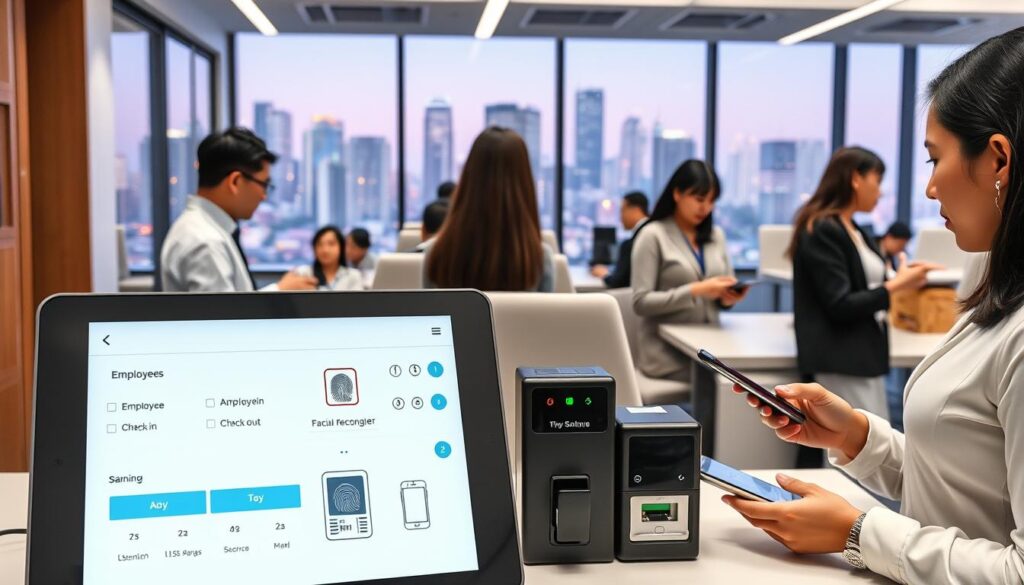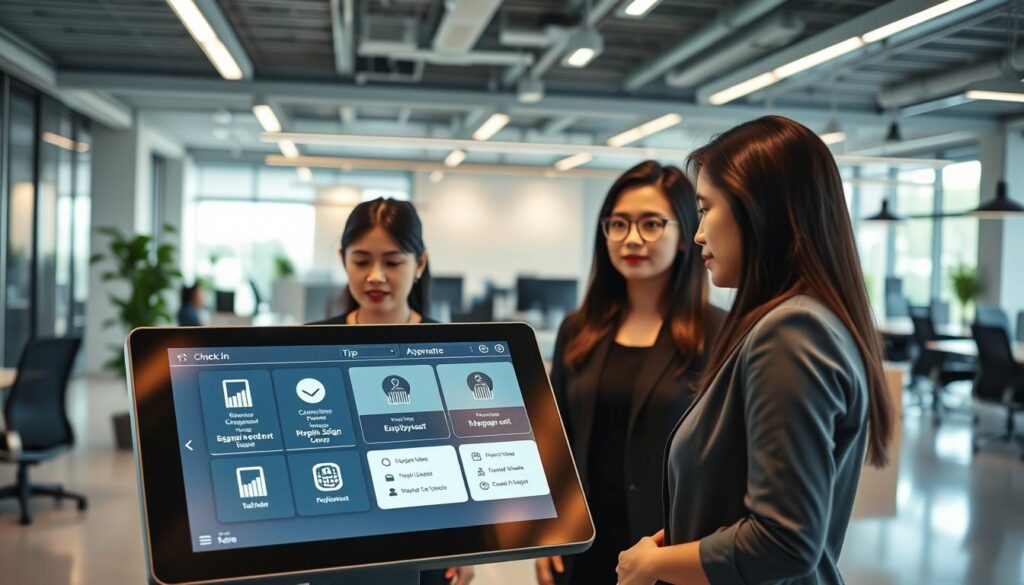Ever thought about how much time and energy businesses could save by ditching old manual attendance processes? More companies in the Philippines are using automated systems. This change is clear in leave tracking and employee management.
These digital solutions make leave requests smoother and improve attendance accuracy. They can cut the administrative work by up to 50%. It’s no wonder companies are choosing automated attendance systems to boost efficiency and employee happiness.
Automating attendance management helps HR teams cut down on errors and improve communication about leave. In today’s fast-paced world, getting leave request responses quickly is a big advantage. This article will explore the benefits of automated attendance systems and how they can change the workplace.
Key Takeaways
- Automated attendance systems can cut manual tracking time by up to 75%.
- Companies report a 30% increase in employee satisfaction with digital leave management.
- Implementing these systems can save HR teams approximately 10 hours a month.
- Real-time tracking enhances the accuracy of attendance records significantly.
- Communication improvements can reach 50% when using integrated leave tracking systems.
The Growing Importance of Automation in HR
Automation in human resources is becoming key for companies. It boosts efficiency and makes employees happier. Automated processes help HR teams do more strategic work, not just routine tasks.
An automated attendance system cuts down on mistakes. It also saves a lot of time. This helps in better managing staff.
Enhancing Efficiency and Accuracy
HR automation makes work faster by cutting down on manual tasks. It lets HR pros spend more time on important tasks. This leads to more productivity.
With an automated attendance system, leave requests are handled quickly and correctly. This reduces errors. It also helps HR teams follow labor laws better.
Boosting Employee Satisfaction through Automation
Automated systems make it easy for employees to check leave balances and make requests. This makes work more transparent and efficient. It also makes employees feel more in control.
HR automation improves communication and makes the workplace better. It leads to happier employees. It also helps leaders make better decisions based on data. For more on effective integrations, visit this page.

Introduction to Automated Attendance Systems
In today’s fast-paced work world, companies are seeing the benefits of automated attendance systems. This change from manual to automated processes brings many advantages to HR operations. It helps solve problems like data entry mistakes and communication issues, making work more efficient.
The Shift from Manual to Automated Processes
Automated attendance systems make tracking easier, saving time and cutting down on payroll errors. They provide an easy way for employees to request leave and check their attendance. This reduces the work for HR teams.
Companies like EmpMonitor and PurelyHR in the Philippines are leading the way. They show how this change helps small and medium businesses work better and be more open.
Studies show big benefits for companies using leave tracking software. For example, they can save up to 80% of time on manual tracking. They also see a 30% drop in payroll mistakes and a 99% accuracy in attendance records.
These systems also make employees more accountable, with 75% saying they know their schedules better. They improve productivity by 20% and cut no-show rates by 39%, keeping employees engaged.
This change in how attendance is managed makes operations smoother. It saves time and money.

The move from manual to automated systems is not just a trend. It’s crucial for companies to succeed in today’s competitive world. Businesses using these systems find they work better and have less administrative work.
Overview of Automated Attendance Systems
Automated attendance systems are key in today’s workplaces. They help manage employee absences well. They offer a single place for tracking attendance data accurately. Schools and hospitals find these systems very helpful.
What Are Automated Attendance Systems?
These systems make tracking attendance easier. They help reduce errors by using real-time tracking. They also automate leave requests, making work more efficient.
Businesses see big improvements in tracking accuracy. They notice a drop in errors by up to 30%.
Key Features of These Systems
The main features of automated attendance systems include:
- Real-Time Tracking: Managers can handle attendance issues quickly, solving problems fast.
- Automated Leave Requests: It makes it easier for employees to request leave. This cuts down on admin work by up to 50%.
- Notifications: Alerts help reduce late arrivals by about 20%.
- Integration Capabilities: They work well with HR and payroll systems, making things more efficient.
- Mobile Accessibility: Apps for tracking attendance boost user engagement by 35%. They help remote workers a lot.
- Data Analytics: Tools for analyzing data help spot trends in attendance. This leads to better management by 40%.
These features help businesses track attendance better. They also see a 25% rise in punctuality. As staffing issues grow, these systems become more important.

Key Features of Automated Attendance Systems
Automated attendance systems offer many features that help manage organizations better. They provide real-time tracking, giving insights into employee attendance as it happens. This boosts visibility and cuts down time spent on manual recording.
Automated notifications keep both employees and managers updated on important attendance news. This ensures everyone is informed and on the same page.
Real-Time Tracking for Enhanced Visibility
Real-time tracking updates attendance systems instantly when employees log in or out. HR teams can track attendance right away. This transparency boosts accountability and helps spot patterns that might impact productivity.
By using these systems, companies can tackle issues like absenteeism and unauthorized access more effectively.
Automated Notifications to Improve Communication
Automated notifications are key for communication, alerting managers when employees mark their attendance. This feature reduces the chance of missed communications and allows for quick action on absence requests. It also promotes a transparent work environment.
This transparency helps create a unified and cohesive workplace.
Analytics and Reporting Tools for Data-Driven Decisions
Analytics tools in attendance systems help gather important data on attendance trends. These reports show employee hours, leave patterns, and policy compliance. With this data, companies can make better decisions to improve workforce management and boost employee satisfaction.

Benefits of Using Automated Attendance Systems
Companies that use automated attendance systems see many benefits. One big plus is better accuracy in keeping track of who’s there. This is because they’ve moved away from old ways of tracking, which were prone to mistakes.
Improved Accuracy in Attendance Records
These systems make tracking easier and more accurate. They make sure every time someone clocks in or out is recorded right. This means less chance of mistakes and more trust between workers and HR.
Time and Cost Efficiency for HR Teams
Going to automated systems saves a lot of money and time. Studies show a 30% cut in admin costs. HR can focus on big projects instead of just paperwork. This also means less money lost to unexpected absences, which cost U.S. businesses about $600 billion a year.
Enhanced Employee Accountability
Automated systems make it clear who’s showing up and who’s not. This makes people more likely to stick to their schedules. It creates a team culture where everyone knows their attendance affects the team’s success.
Compliance with Labor Laws
These systems help companies follow labor laws by keeping accurate records. Companies using them see a 60% better track record in meeting leave and attendance rules. This helps avoid legal problems and keeps businesses on the right side of the law.
How Automated Attendance Systems Transform Employee Management
Automated attendance systems change how companies manage employees, focusing on absence management. They make it easier for HR to keep accurate records. This helps teams stay productive by quickly handling absences.
These systems also help prevent problems before they start. This proactive approach keeps the workplace running smoothly.
Streamlined Absence Management Processes
Using automated systems cuts down on absences by 30% in the first year. They make it easy to track who’s where and when. This helps HR spot trends fast.
Managers can then plan better, keeping everyone on track. This leads to a more responsible and productive team.
Proactive Absence Management Techniques
Being proactive is key to reducing absences and boosting morale. Automated systems use AI to forecast who might be absent. This helps plan better and manage teams more effectively.
80% of users say these insights have made their management better. It’s a big win for keeping teams in top shape.
Enhanced Communication and Transparency within Teams
Good communication and transparency build trust. Automated systems let everyone see their attendance. This makes everyone more accountable and helps teams work together better.
For small businesses in the Philippines, this is crucial. It helps them keep an eye on things even when teams are spread out.
| Statistic | Impact |
|---|---|
| 70% of organizations report improved accuracy in attendance records | Strengthens reliability in employee management |
| 40% reduction in time spent on manual attendance tracking | Increases efficiency of HR processes |
| 30% decrease in absenteeism rates | Enhances overall team productivity |
| 80% of AMS users see improved workforce management strategies | Encourages data-driven decision-making |
| 55% of organizations can predict absenteeism trends | Facilitates proactive management techniques |
Choosing the Right Automated Attendance System
Choosing the right automated attendance system is key. You need to look at several factors. These include system features, how well it can grow with your business, and if it fits with your current HR tools. Also, it must follow local labor laws.
By checking these points, you can pick a system that makes managing attendance easier. This will help your business run more smoothly.
Key Considerations When Selecting a System
- Features: Look for things like real-time tracking, automated alerts, and options for employees to request leave online.
- Scalability: Make sure the system can grow with your business. It should handle changes in your workforce and company size.
- Integration: The system should work well with your current HR software. This makes setup easier and less disruptive.
- Compliance: The system must follow local labor laws. This is important to avoid fines and keep accurate records.
Popular Automated Attendance Solutions in the Market
Many companies offer popular attendance solutions. TeamSense and Jibble are two examples. They have features that meet different business needs.
For example, TeamSense is great for teams that work remotely or are always on the move. It has easy-to-use features for reporting absences by text. Businesses in the Philippines should compare these options to find the best fit for their needs.
| Solution | Key Features | Best For |
|---|---|---|
| TeamSense | Text-based absence reporting, mobile accessibility, integration with HR tools | Remote and mobile teams |
| Jibble | Biometric options, timesheet management, project tracking | Businesses needing time-tracking accuracy |
| Workstatus | Activity monitoring, payroll integration, productivity analytics | Organizations focused on maximizing productivity |
Implementing an Automated Attendance System
Setting up an automated attendance system needs careful planning. It’s important to talk to key people and set clear goals. This helps HR teams in the Philippines pick the right system for their needs.
By planning well, businesses can make their system work better. This is key for a successful change.
Steps for Successful Planning and Preparation
Here are the main steps for setting up automated attendance tools:
- Look at how you currently track attendance and find ways to get better.
- Talk to stakeholders to set goals and what you want to achieve.
- Find a good automated attendance system that fits your needs.
- Plan how to move your data to the new system without trouble.
- Set up the system and make it fit your company’s needs.
Training and Support for Employees
Good training and support are key for employees to use the new system well. Offer guides, tutorials, and workshops to help them get started. Think about these things:
- Give detailed training sessions for different levels of users.
- Have a support team ready to help with problems and questions.
- Listen to feedback to keep making the system better.
- Make the system easy to use so everyone can join in.
Good training and support help employees adjust to the new system. This makes work more efficient and helps everyone stay accountable.
Conclusion
Automated attendance systems are a big step forward in managing employee leave. They help businesses work better and save time and money. With these systems, companies can cut down on leave request time by 50% and lower costs by 30%.
These systems also make sure businesses follow labor laws. They help avoid mistakes and create a fair and open work environment. This leads to a better team culture.
Automated systems also make employees happier. They use self-service portals, which makes them 30% more satisfied with their jobs. They get leave approved faster, which makes their work-life balance better.
More companies are seeing the value of these systems. They help improve how work is done and make the workplace better. Investing in these systems is key for growth.
As businesses deal with managing their teams, automated systems are crucial. They boost productivity and help companies succeed. It’s clear that automation is not just a trend but a must for better leave management and a more efficient workplace.
